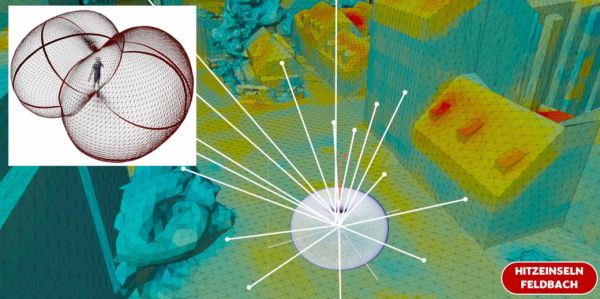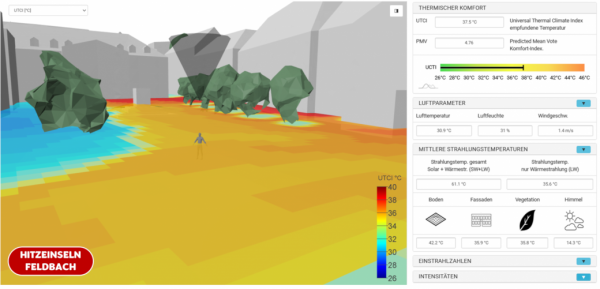Heat islands Feldbach - Synergetic measures against overheating and heavy rain in preparation for an R&D&I project in Feldbach
Short Description
Starting point / motivation
Adapting urban spaces to future living requirements and conditions is a major challenge. Climate change-related heat and heavy rainfall events in particular pose major problems. Green (and blue) infrastructures, especially on buildings, are key aspects on the way to climate-resilient, energy-efficient and liveable cities.
There are numerous individual measures available on the market for the problem areas of overheating OR heavy rainfall. However, measures such as green infrastructures can also be designed in such a way that, in addition to a cooling effect, they also take on synergetic tasks with regard to rainwater management in highly dense and sealed city centres.
Contents and goals
The exploratory study analyses and evaluates the feasibility of a subsequent R&D&I project and serves to decide whether and in what form and with what content it will be carried out. There is hardly any experience in this regard and the following questions arise:
- How great are the effects of synergetic measures using new technologies with regard to both individual aspects - overheating and heavy rainfall?
- Is the cost-benefit ratio of (more complex) synergetic measures advantageous compared to that of (simpler) individual measures?
Methods
- The innovative digital analysis method "Smart City Sensing" for thermal comfort and urban heat islands is used to analyse the urban core area. The result is a three-dimensional data model that can be used to determine locations for measures for a subsequent demonstration.
- Based on structural designs and empirical values from the operation of municipal buildings and technical systems that are located outside the core area, it is determined whether and which measures can be used there. In this regard, the measures of retention roof, active evaporation of rainwater on existing roofs, storage raised beds, technical systems (fences, walls, etc.) and dual use with energy generation are considered.
- Determination of measures and definition of scenarios for a subsequent implementation project. These scenarios are evaluated and optimized using the "Green Scenario" analysis method, which calculates, evaluates and optimizes specific parameters for defined areas. The results regarding the effects of rainwater management, effects of green infrastructure, sealing and albedo as well as costs and benefits form an ideal basis for decisions regarding the subsequent R&D&I project.
- A cost estimate for implementation is carried out for the scenario for which the decision has been made.
- Creation of an implementation concept (schedule, financing, etc.)
Expected results
- Digital model of the overheating problem areas in the city centre of Feldbach
- Evaluation results regarding function, impact and cost-benefit ratio of technologies or measures.
- Implementation plan for a subsequent demonstration (experimental development) in Feldbach, which contains technologies or measures that promise the greatest possible multiplication among the residents and can be used in many similar cities.
Project Partners
Project management
LEA GmbH
Project or cooperation partners
- 4ward Energy Research GmbH
- AEE INTEC
- AllesDach Wagner GmbH
- Stadtgemeinde Feldbach
Contact Address
LEA GmbH
Anna Kranz
Mühldorf 165
A-8330 Feldbach
Tel.: +43 (3152) 38911 508
E-mail: kranz@lea.at
Web: www.lea.at


